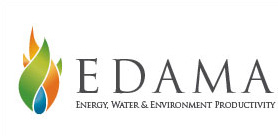 The United Arab Emirates could save approximately 30 per cent of its daily water use if multi-residential buildings implement greywater recycling programs, according to a recent report compiled by researchers from the University of Sharjah. Currently the average Emirati consumes roughly 550 liters of clean water every day, 30% of which is flushed down the toilet. Literally.
The United Arab Emirates could save approximately 30 per cent of its daily water use if multi-residential buildings implement greywater recycling programs, according to a recent report compiled by researchers from the University of Sharjah. Currently the average Emirati consumes roughly 550 liters of clean water every day, 30% of which is flushed down the toilet. Literally.
If groundwater supplies weren’t running dry and if water didn’t have to be treated in desalination plants, which requires a great deal of energy, this would be less of a travesty. But the Environment Agency Abu Dhabi estimates that the UAE could run out of groundwater within the next five decades if serious measures aren’t put in place to curtail consumption.
The report A Framework for Reducing Water Demand in Multi-Storey and Detached Dwelling details what it would take to implement greywater recycling programs in the UAE. Specifically it addresses multi-residential buildings given that a great majority of the Emirati and expatriate population lives in dwellings of this type.
Within buildings taller than ten floors will recover the cost of installing an onsite treatment system that uses recycled water from the top floors for the remaining building’s plumbing within five years, according to the report. Whereas smaller buildings will have to wait longer.
“Water issues are very important for the UAE. We are spending a lot of money on desalination and all the other infrastructure that goes with it,” one of the authors of the report, Professor Abdallah Shanableh, an environmental engineer at University of Sharjah told The National.
“We need to do whatever we can to reduce consumption of water,” he added.
Unfortunately, the current system doesn’t give landowners a lot of incentive to recycle water, which is why Shanableh urges government to subsidize a nationwide program. In so doing, daily water consumption could drop to just 385 liters a day.
One fifth of the world’s population battles water scarcity according to the World Health Organization and demand for this life force continues to explode alongside population.
Until recently, wealthy Gulf countries have been consuming water with impunity, ignorant of the long term consequences. But within the last few years, the gravity of a future without groundwater supplies, which receive little to no rainfall replenishment, has begun to settle in and a series of initiatives have been implemented to avoid the worst.
In 2010, Abu Dhabi announced that it was creating an artificial reservoir in a secret location and filling it with desalinated water in the event of an emergency. When that story broke, it emerged that if desalination facilities fail, the emirate will only have enough water to satiate its expanding population for a few short days.
But Muslims are reluctant to consider re-using wastewater, which could be a barrier, though we suspect that these sensibilities will be forced to evolve.
:: The National
Image of reclaimed water sign, Shutterstock



